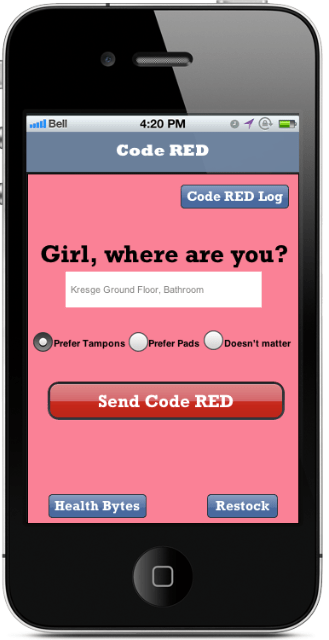Advertisement
Desperately Seeking A Tampon? There's An App For That
http://www.youtube.com/watch?v=t7Q5qM5jy-0
For 18-year-old Olenka Polak, the eureka moment came in a Harvard bathroom.
While at the college's innovation lab attending a recent "start-up scramble" aimed at helping young entrepreneurs develop new ideas, Olenka, a sopohmore, went to the women's restroom and was pleasantly surprised by a basket full of free tampons. How cool, she thought. But then she wondered: What if there were no free tampons and the vending machine was out of order and you were just plain stuck in "a periodic emergency?"
That's when Olenka had the flash: "Wouldn't it be cool to have this community of women on a mobile platform and have this kind of tampon hand-off where you could earn points for donating a tampon to a fellow sister in need?"
With this vision of girl-power camraderie dancing in her head, Olenka returned to the event, raised her hand and pitched her idea: There, Code Red, the mobile tampon app, was born.

A Code Red team including Olenka and two other women — Isha Agarwal and Yogeeta Manglani, both 24-year-old graduate students in global health at Harvard's School of Public Health — quickly coalesced and started brainstorming. They came up with a simple prototype: a mobile app that would allow women in need to send out a "red alert" that would ping other nearby users who could rush over and delivery a tampon or sanitary pad or share information on where the nearest working tampon vending machine might be. (The machines are usually out of order and in some buildings simply non-existent, said Agarwal, who is also a student at Harvard Medical School.)
The interface the team has developed asks whether a pad or tampon is preferred; respondents can send back a yes or no answer about whether help is on the way. They can also initiate a chat, to say, for example, "class is just wrapping up, I'll be there in 10 minutes." The mockup also includes "health bytes," a running ticker of women's health stories to read while you're waiting. The mapping system would track and update users' GPS locations with each ping.
Advertisement
Security is clearly an issue and the team has proposed an initial launch within the Harvard community to enable a verification system using Harvard ID numbers.
But beyond tampon distribution, the Code Red team hopes to broaden its reach and become a platform for other types of women's health needs.
For example, the app might include an automatic phone reminder for women to change their tampons in order to cut their risk of toxic shock syndrome.
They might institute a rewards system that allows red-alert respondents who frequently deliver tampons to other women to win points. Those could be redeemed for "craving coupons" — prizes, like ice cream or frozen yogurt at the local shop, or discounts on related health products, like, maybe, $2 off your next box of tampons.
[module align="right" width="half" type="pull-quote"]"Wouldn't it be cool to have this community of women on a mobile platform and have this kind of tampon hand-off where you could earn points for donating a tampon to a fellow sister in need?"[/module]
There are discussions underway about partnering with a feminine hygiene company; the women have done some initial market research and discovered that while tampon makers are keen to gain a footing in social media, their sites are fairly obscure, with relatively low traffic.
"We're generally thinking about women's health and well-being and about problems particular to women in college that haven't been addressed," Agarwal said. "For example, general safety: If it's 11 pm and you don't feel safe walking back to your dorm, you send out a Code Red and another woman could walk with you. Basically we're trying to create a community among women."
Manglani said she envisions an app for women facing all types of personal emergencies. She told the story of a mother stuck at an airport facing a five-hour flight delay and no more diapers for her baby. Wouldn't it be great, she said, to be able to send an alert for extra diapers?
Eventually, the Code Red group said, one might use the app to support impoverished women around the world, perhaps partnering with a nonprofit such as Sustainable Health Enterprises, which helps local women in developing countries "jump-start their own businesses to manufacture and distribute affordable, quality, and eco-friendly sanitary pads."
To generate support for their plan, the group met today with Gina Helfrich, director of the Harvard College Women's Center, to make their pitch.
In an email, Helfrich called the tampon app a "very clever" one that "seems to meet a unique need for women."
"This morning we brainstormed together about ways to help them find someone to actually do the coding of the app — I'm hopeful that some of the connections they will make with other women around Harvard will bear fruit," Helfrich said.
Not everyone, though, totally gets it.
When the Code Red Team recently put out a message on an academic list-serve requesting software developers to help with the app, one male reader noted "this is pretty weird."
The response: "What's weird exactly? That women have periods? Or that women might want to help those in an embarrassing situation?"
In any case, the Code Red women say this is a great unmet need. In a survey they conducted of 71 college women, nearly three-quarters said they'd been stuck without a tampon or pad at least once in the past year. When asked if they'd be interested in an app to find the nearest tampon or pad, 74% said yes.
Readers what do you think? Would you respond to an urgent request with a tampon for a stranger?
This program aired on October 12, 2012. The audio for this program is not available.
